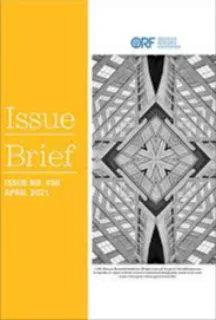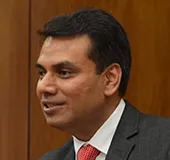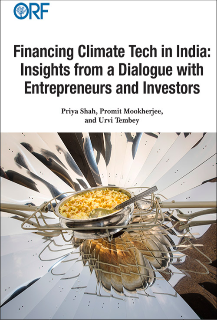The global community began this year with the singular aim of ending the Covid-19 pandemic. This would only be possible if more and more people all over the world are vaccinated, and as quickly as possible. Given the enormous demand, the production of vaccines has to be increased manifold and followed by ensuring wider and equitable distribution. An IP waiver alone cannot accomplish such task. Increasing the production of vaccines and ensuring their equitable access would also require building the institutional capacity in several countries, overcoming systemic bottlenecks, and undertaking the necessary reforms in the administrative machinery and the legal framework. Nonetheless, a TRIPS waiver could be an important step in scaling up the production of the vaccines.
Voluntary efforts like COVAX that aim to accelerate the development and production of vaccines might not be enough, given the enormity of the challenge. While countries that have manufacturing capability can make use of TRIPS flexibilities like compulsory licenses, the same cannot be said about those that lack such capacity especially LDCs in Africa and Asia. The argument that suspending IP rights would be a disincentive for the pharmaceutical sector is untenable: given the huge demand, these companies are assured of returns. Moreover, pharmaceutical companies often benefit from public grants and public money[51] including in the development of Covid-19 vaccines.[52] Therefore, it is legitimate that the benefits should be shared with the society at large. As the World Health Organization rightly says, “with a fast-moving pandemic, no one is safe, unless everyone is safe.”[53] Therefore, the global community needs to pull out all stops including a temporary TRIPS waiver.
About the Author
Prabhash Ranjan is Senior Assistant Professor at the Faculty of Legal Studies, South Asian University, New Delhi. ([email protected]) Views are personal. He expresses his gratitude to Vikas Kathuria for his comments on an early draft, and to Harsh Manohar for his help.
Endnotes
[a] These countries include Kenya, Eswatini, Mozambique, Pakistan, Bolivia, Venezuela, Mongolia, Zimbabwe, Egypt, the African Group, and the Least Developed Countries Group.
[b] The Ministerial Conference is the highest decision-making body in the WTO.
[1] Peter Van den Bossche and Werner Zdouc, The Law and Policy of the World Trade Organization (Cambridge: Cambridge University Press, 2013), pp. 952.
[2] See Peter Drahos (2007), “Four Lessons for Developing Countries From the Trade Negotiations Over Access to Medicines”, Liverpool Law Review, 28, no.1 (April 2007): 15-16.
[3] Susan Sells, Private Power, Public Law: The Globalization of Intellectual Property Rights (Cambridge University Press: Cambridge, 2003); Peter Drahos and John Braithwaite, Information Feudalism: Who Owns the Knowledge Economy? (London: Earthscan, 2002).
[4] See Piragibe dos Santos Tarragô, “Negotiating for Brazil” in The Making of the TRIPS Agreement Personal Insights from the Uruguay Round Negotiations, ed. Jayashree Watal and Antony Taubman (Geneva: World Trade Organization, 2015), 240-241.
[5] This was for several reasons with one of the prominent reasons being that a stringent intellectual property system will have an impact on the prices of pharmaceutical products. See Daniel Gervais, The TRIPS Agreement: Drafting, History and Analysis (London: Sweet and Maxwell, 1998), pp. 19.
[6] Simon Lester, Bryan Mercurio and Arwel Davies, World Trade Law: Text, Materials and Commentary (Oxford: Hart, 2018), pp. 804-805.
[7] Sarah Joseph, Blame it on the WTO: A Human Rights Critique (Oxford: Oxford University Press, 2011), pp. 241.
[8] Sunil Kanwar and Robert Evenson, “Does Intellectual Property Protection Spur Technological Change”, Oxford Economic Papers, 55, no. 2 (April 2003): 235-264.
[9] Joseph, Blame it on the WTO: A Human Rights Critique, pp. 217; Medecins Sans Frontieres (MSF), A Fair Shot for Vaccine Affordability, 21 Sept 2017, Geneva, Medecins Sans Frontieres, 2017.
[10] See Article 28 of the TRIPS Agreement
[11] See Article 33 of the TRIPS Agreement
[12] Chris Kay and Haslinda Amin, “Vaccine Nationalism Threatens WHO’s 2021 Goal of 2 Billion Doses”, Bloomberg Quint, March 17, 2021.
[13] Waiver From Certain Provisions of the TRIPS Agreement For the Prevention, Containment and Treatment of Covid-19, Communication from India and South Africa, IP/C/W/669, 2 October 2020 (hereinafter “TRIPS Waiver Proposal”).
[14] TRIPS Waiver Proposal, paras 9 and 10.
[15] TRIPS Waiver Proposal, para 12.
[16] “Members discuss TRIPS waiver request, exchange views on IP role amid a pandemic”, World Trade Organisation, February 23, 2021.
[17] “Members discuss TRIPS waiver request, exchange views on IP role amid a pandemic”.
[18] “Rich, developing nations wrangle over COVID vaccine patents”, Reuters, March 10, 2021.
[19] “Rich, developing nations wrangle over COVID vaccine patents”.
[20] See James Bacchus (2020), “An Unncessary Proposal: A WTO Waiver of Intellectual Property Rights for Covid-19 Vaccines”, CATO Institute, Free Trade Bulletin, 78 (February 2021); Bryan Mercurio, “WTO Waiver from Intellectual Property Protection for COVID-19 Vaccines and Treatments: A Critical Review”, SSRN Working Paper, (2021).
[21] For a detailed discussion on WTO’s Waiver power, See Isabel Feichtner, “The Waiver Power of the WTO: Opening the WTO for Political Debate on the Reconciliation of Competing Interests”, European Journal of International Law, 20, no. 3, (August 2009): 615-645.
[22] On 15 November 1995, the General Council of the WTO decided that although support of three-fourths is needed to adopt a waiver, it would first try to decide by consensus. If consensus cannot be reached, then the matter shall be decided by the three-quarters majority – WTO, Decision Making Procedures under Article IX and XII of the WTO Agreement, WT/L/93.
[23] Feichtner, “The Waiver Power of the WTO: Opening the WTO for Political Debate on the Reconciliation of Competing Interests”, 620.
[24] Appellate Body Report, EC – Bananas III, WT/DS27/AB/R (WTO, 2008), para. 185
[25] General Council, Waiver Concerning Kimberley Process Certification Scheme for Rough Diamonds, Decision, (WTO, 15 May, 2003), WT/L/518. In 2006, the General Council extended the waiver.
[26] General Council, Implementation of Paragraph 6 of the Doha Declaration on the TRIPS Agreement and Public Health, Decision, WT/L/540 (WTO, 30 August, 2003).
[27] An exporting member means a WTO member country using the system set out in this Decision to produce pharmaceutical products for, and export them to, an eligible importing Member. See “Implementation of Paragraph 6 of the Doha Declaration on the TRIPS Agreement and Public Health”, para 1(c).
[28] Eligible importing member means any LDC and any other Member that has made a notification to the Council for TRIPS of its intention to use the system as an importer. For more on this see 2003 Decision, para 1(b).
[29] “Implementation of Paragraph 6 of the Doha Declaration on the TRIPS Agreement and Public Health”, para 2.
[30] “Implementation of Paragraph 6 of the Doha Declaration on the TRIPS Agreement and Public Health”, paras 2(a)(i) and 2(a)(ii).
[31] “Implementation of Paragraph 6 of the Doha Declaration on the TRIPS Agreement and Public Health”, para 2(a)(iii).
[32] “Implementation of Paragraph 6 of the Doha Declaration on the TRIPS Agreement and Public Health”, para 3.
[33] See “Implementation of Paragraph 6 of the Doha Declaration on the TRIPS Agreement and Public Health”.
[34] “Implementation of Paragraph 6 of the Doha Declaration on the TRIPS Agreement and Public Health”, para 2(b)(i)
[35] “Implementation of Paragraph 6 of the Doha Declaration on the TRIPS Agreement and Public Health”, para 2(b)(ii)
[36] “Implementation of Paragraph 6 of the Doha Declaration on the TRIPS Agreement and Public Health”.
[37] Bacchus, “An Unncessary Proposal: A WTO Waiver of Intellectual Property Rights for Covid-19 Vaccines”, Mercurio, “WTO Waiver from Intellectual Property Protection for COVID-19 Vaccines and Treatments: A Critical Review”.
[38] Ellen FM ‘t Hoen et al., “Medicine procurement and the use of flexibilities in the Agreement on Trade-Related Aspects of Intellectual Property Rights, 2001–2016”, Bulletin of the World Health Organization 96 (2018).
[39] Hoen et al., “Medicine procurement and the use of flexibilities in the Agreement on Trade-Related Aspects of Intellectual Property Rights, 2001–2016”.
[40] See Article 66.1 of the TRIPS Agreement.
[41] “US Attacks on India’s Patent Laws”, Médecins Sans Frontières, January 21, 2015.
[42] “Implementation of Paragraph 6 of the Doha Declaration on the TRIPS Agreement and Public Health”.
[43] TRIPS Agreement (as amended on 23 January 2017).
[44] Oxfam International, Patents versus Patients, five years after the Doha Declaration, Oxfam Briefing Paper 95, November 2006, Oxfam International (2006).
[45] “Implementation of Paragraph 6 of the Doha Declaration on the TRIPS Agreement and Public Health”.
[46] See Holger P. Hestermeyer, “Canadian-Made Drugs for Rwanda: The First Application of the WTO Waiver on Patents and Medicines”, American Society of International Law, Insights, 11, no. 28 (December 2007); Donald Harris, “TRIPs after Fifteen Years: Success or Failure, as Measured by Compulsory Licensing”, Journal of Intellectual Property Law 18, no. 2 (March 2011): 367. For a different view on this see Frederick M Abbott and Jerome H Reichman, “The Doha Round’s Public Health Legacy: Strategies for the Production and Diffusion of Patented Medicines under the Amended TRIPS Provisions” Journal of International Economic Law, 10 (2007): 921.
[47] Carlos M Correa, “Will the Amendment to the TRIPS Agreement Enhance Access to Medicines?” South Centre, Policy Brief, 57 (January 2019).
[48] Hestermeyer, “Canadian-Made Drugs for Rwanda: The First Application of the WTO
Waiver on Patents and Medicines”. Also see Correa, , “Will the Amendment to the TRIPS Agreement Enhance Access to Medicines?”.
[49] Siva Thambisetty “Vaccines and patents: how self-interest and artificial scarcity weaken human solidarity”, LSE British Politics and Policy, February 9, 2021.
[50] Thambisetty “Vaccines and patents: how self-interest and artificial scarcity weaken human solidarity”.
[51] Thambisetty “Vaccines and patents: how self-interest and artificial scarcity weaken human solidarity”.
[52] Judy Stone, “The People’s Vaccine – Moderna’s Coronavirus Vaccine Was Largely Funded by Taxpayer Dollars”, Forbes, December 3, 2020.

 PDF Download
PDF Download



 PREV
PREV


